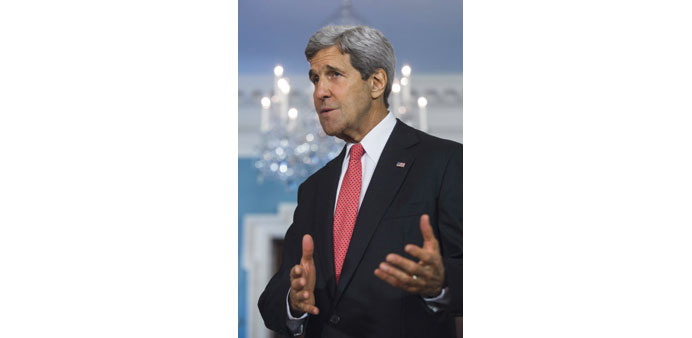Reuters
Milan
US Secretary of State John Kerry yesterday urged global leaders to agree an “ambitious” deal at a climate conference in Paris in December, saying global warming was the biggest threat to global food security.
“We need every country on the same page, pushing an ambitious, durable and inclusive agreement that will finally put us on the path toward a global clean-energy future,” Kerry told an audience at the Milan Expo, where the focus is on “Feeding the planet” and new approaches to sustainable food.
He said extreme weather patterns - with 19 of the 20 warmest years on record occurring in the past two decades - meant the world must act now, in a coordinated way.
A climate deal would boost the confidence of businesses to invest in low-carbon, clean energy alternatives, and “hopefully move the private sector to be one of the great agents of action in addressing the climate challenge,” he said.
Kerry said the migrant crisis in Europe, caused by Syrians and Africans fleeing conflict, would pale in comparison to the mass migration that intense drought, rising sea levels and other impacts of climate change were likely to bring.
Just before war erupted in Syria, the country had faced its worst drought on record, Kerry said, forcing as many as 1.5mn people from farms to cities and intensifying the political uprising against Syrian President Bashar al-Assad in 2011 that eventually led to the war.
“I’m not suggesting the crisis in Syria was caused by climate change ... but the devastating drought made a bad situation a whole lot worse,” he said.
The UN climate conference is designed to reach a plan to cap steadily rising greenhouse gas emissions to avert a dramatic rise in extreme weather.
Earlier, Kerry held talks with his Italian counterpart in which they discussed Europe’s refugee crisis, violence in the Middle East and Russia’s role in Europe and the Syrian crisis.
Meanwhile, Europe’s climate chief has said that the European Union will push for a UN deal to cap global warming that spans the century and for checks on progress every five years.
Climate and Energy Commissioner Miguel Arias Canete said any deal reached at talks in Paris starting next month must also have an element of “dynamic increase of ambition over time” to cut emissions further.
“First we want a binding agreement, but we want a deal which is valid for the whole century,” said Arias Canete, in Tirana to discuss energy isues with officials of Balkan and Black Sea states.
“We do not want the Paris agreement with commitments ending in 2030 because the Paris agreement cannot be an agreement that starts in 2020 or 2021 and finishes in 2030, like the Kyoto Protocol, which finishes in 2020.”
There is a gap between what will be put on the table at talks in Paris in November 30 and what is needed to fight global warming, Arias Canete said, referring to pledges by 150 states accounting for 90% of global emissions.

